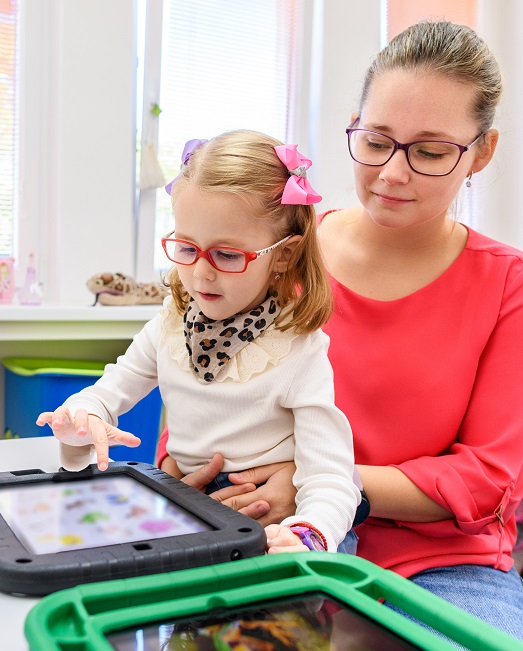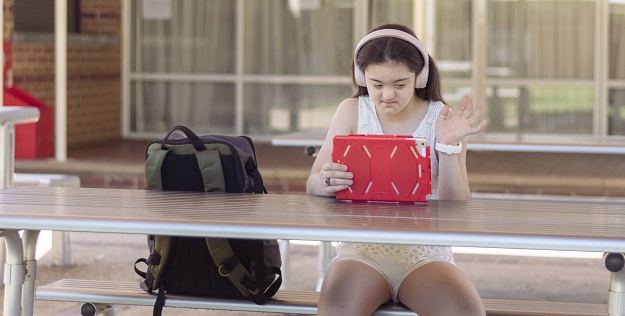Community
Copyright@ Australian Catholic University 1998-2026 | ABN 15 050 192 660 CRICOS registered provider: 00004G | PRV12008
Copyright@ Australian Catholic University 1998-2026 | ABN 15 050 192 660 CRICOS registered provider: 00004G | PRV12008

In a previous life, Melissa Cain was a musicologist. She lived abroad in Singapore, teaching music at a prestigious international school and conducting research on various aspects of music education. Things changed when her son Mikhail was born with a rare vision impairment known as Peters anomaly, which affects just one in a million people.
As she and her family adapted to the new circumstances, they decided to return home to Australia.
“I just assumed he would attend a school for the blind, and lo and behold, we came back to Brisbane and there were no schools for the blind,” says Dr Cain, a senior lecturer and national head of secondary initial teacher education with ACU’s National School of Education.
Mikhail soon found a place in a well-regarded private school, making him among the 90 per cent of Australian students with disability, or an estimated 380,000 children, who are enrolled in mainstream schooling.
But while these numbers are encouraging, many of these students still face barriers to genuine inclusion. Often they’re left out of school activities in the classroom and the playground, meaning they fail to benefit from opportunities offered to other students.
As she began to meet other parents trying to navigate this reality, Dr Cain started to shift her research focus towards inclusive education, teaming up with the University of Southern Queensland’s Melissa Fanshawe – whose son has the same rare condition – to explore the challenges faced by students with vision impairment in mainstream schools.
Over the past seven years, they have interviewed more than 100 students with disability, as well as many parents, carers and teachers, providing valuable insights on their experiences.
One of their key conclusions is that students with disability are experts on their own needs and goals, relying on personalised knowledge and lived experience to find novel solutions to the problems they encounter.
“What we’ve found through our research is that teachers will often make decisions on behalf of students with disability, sometimes without consulting them – and this is unhelpful because the students know themselves better than anybody else,” Dr Cain says. “If we just take the time to listen to students with disabilities, we give them the chance to reveal all sorts of amazing things we hadn’t thought of.”
Take her son Mikhail, who decided to program his talking watch to alert him five minutes before the school bell rings, allowing him to make his way to his next class without having to negotiate a crowd of kids trying to do the same. This simple solution is a neat example of why listening to student voices can improve their experience at school, thereby helping to foster true inclusion.
As one high school student with a vision impairment told the researchers: “I think listening to the student is the most important part.”
While equitable access and participation in education is recognised as a fundamental human right, Dr Cain says there’s much work to be done in the pursuit of “authentic and successful” inclusive education.
Research has shown that children with disabilities have better life outcomes if they are educated in the mainstream system; and yet, as was found by the disability royal commission, mainstream schools need major reforms to overcome persistent barriers that prevent access to “safe, equal and inclusive education”.
Often the most stubborn barriers are attitudinal, says Dr Cain, who recently co-authored an article about the inclusive education for The Conversation. In mainstream schools, students with disability are commonly forced to contend with negative stereotypes, and are stalled by watered-down expectations.
“In many cases these barriers haven’t been overcome because of the persistence of certain attitudes towards difference,” she says. “These attitudes are often accompanied by very low standards and low expectations for students with disability, where the teachers focus on deficits and assume the students are incapable of having agency.”

In a school setting, this might play out with a teacher not allowing a student with disability to participate in sport or other physical activities, due to the higher risk of injury. In some cases this might be well-meaning; however, it can have lasting damage, causing students with disability to feel isolated and ignored.
“It is really important that we employ an attitude of allowing or supporting the concept of ‘dignity of risk’, where students are given a chance to take risks in order to learn and grow, ” says Dr Cain, citing research showing that risk-taking helps children with disabilities to develop lifelong skills and independence.
“What we’re looking for from mainstream schools is the full educational experience, where children with disability are allowed to participate on all levels of learning – academic, physical, social, and emotional. That means they’re given the opportunity to compete in the swimming carnival, and to go on school camps and excursions, even if the teacher is concerned that the student might get hurt.”
It is undoubtedly true that inclusive education can be a great equaliser in a world where people with disability face widespread disadvantage.
But why is the rhetoric on inclusive education so often not reflected in the reality?
“I like to think of inclusive education as an ongoing conversation,” says Dr Cain, who teaches inclusive education to pre-service teachers at ACU. “We have legislation and we have policies, and we have the rhetoric behind the policies, but we need to continue to grow the awareness among teachers and the broader community. That’s not something that can happen overnight.”
One area that has seen genuine progress is the role of parental advocacy. Nowadays, there is a widespread acceptance that parents and carers have a wealth of information about their child’s abilities and impairments, and can be a great source of help to both student and teacher.
“This has been a huge success story,” she says. “We’ve moved past the old expectation that parents of students with disability are really annoying or hard to get along with, or at the other end of the scale, they do very little to advocate because they don’t want to bother the teacher or principal. Teachers are now much more aware that parents bring a huge amount of knowledge to the table.”
Dr Cain is ever mindful that hers is a unique position. As a parent of a child with disability who also is an expert on inclusive education, she has access to insight that few others can grasp.
“I feel extremely privileged to be in the position to teach and research in this area while also having that parental perspective,” she says. “Coming at it from those different angles has been really fabulous.”
As for Mikhail, who was the first student with blindness to attend his school, he is headed to university to study law. Not only has he thrived academically at school, but he has also served in student leadership positions, learned to play musical instruments, and competed in sports against sighted peers.
“He’s had amazing teachers and has just had an incredible experience at school, and thanks to that, he has a bright future for further education and employment,” Dr Cain says.
She points to this as an example of inclusive education benefitting the wider school community, as well as the student with disability.
“Everybody benefits, and hopefully with increased awareness, this is something we come to see more of in the years to come, where people understand that students with disability can contribute to society just as anybody else would. In the end, the hope is that there’s no need for this term ‘inclusive education’ – we can just call it education.”
Dr Melissa Cain is a Senior Lecturer, National Head of Discipline (Secondary ITE), and Course Coordinator in the National School of Education at ACU. Her current research centres on inclusive education and initial teacher education with a focus on supporting students with blindness or low vision in mainstream educational contexts. Melissa has received several higher education teaching awards and is the recipient of the Callaway Doctoral Award.
Discover your career in teaching.
Copyright@ Australian Catholic University 1998-2026 | ABN 15 050 192 660 CRICOS registered provider: 00004G | PRV12008